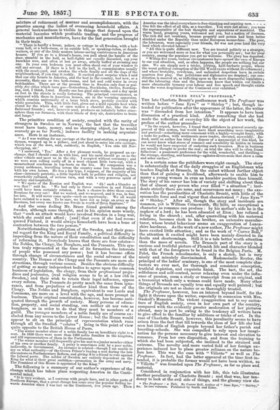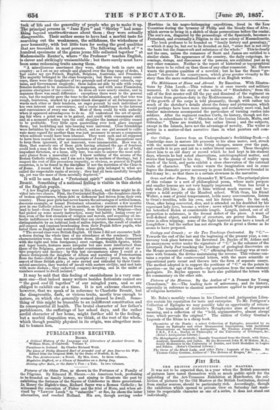CITRRER BELL'S PROFESSOR. * THE late Charlotte Brontk's posthumous work The
Professor was written before "Jane Eyre" or " Shirley," ; but, though intended for publication after the appearance of the latter, the writer was "dissuaded from her intention." It appears to have been dissuasion of a practical kind. After remarking that she had made the reflection of everyday life the object of her work, the preface of the author proceeds— "In the sequel, however, I found that publishers in general scarcely approved of this system, but would have liked something more imaginative and poetical—something more consonant with a highly-wrought fancy, with a taste for pathos, with sentiments more tender, elevated, unworldly. Indeed, until an author has tried to dispose of a manuscript of this kind, he can never know what stores of romance and sensibility lie hidden in breasts he would not have suspected of eaaketing such treasures. Men in business are usually thought to prefer the real ; on trial the idea will be often found fallacious : a passionate preference for the wild, wonderful, and thrilling-the strange, startling, and harrowing—agitates divers souls that show a Calm and sober surface."
In a certain sense the publishers were right enough. The story is substantially that of the daily struggles of an Englishman who teaches English at Brussels, in the outset without further object than that of gaining a livelihood, afterwards to enable him to marry a young woman in even an humbler position than himself. The story of his career has leis of variety and shifting about'than that of almost any person who ever filled " a situation" ; incidents strictly there are none, and occurrences not many ; the execution has the peculiarities of Charlotte Brontë, with little of the spasmodic force and real vigour that characterized ," Jane Eyre" or "Shirley." After all, though the story and incidents are 'Common yet is William. Crimsworth, tie hero, as exceptional a character as romance can produce : by his mother's side he lathe nephew of a lord; he has been educated at Eton ; has refused a livmg in the church; and, after quarrelling with his maternal relations, becomes clerk to his brother, an extensive manufacturer, whose brutal behaviour seems an exaggeration of Lancashire hardness. As the work of anew author, The Professor might have excited little attention; and as the work of "Carver Bell," the attention it excited might have been mainly directed to its faults and shortcomings. Still it is a tale better worth attention than the mass of novels. The Brussels part of the story is a curious and truthful picture of Flemish life and character blended with that of the foreigners to be found in the Belgian Paris. , M.•Pelet, the French schoolmaster, is only a sketch, but is very nicely: and minutely discriminated. Mademoiselle Reuter, the principal of the ladies' seminary, is one of the most complete ohsrooters we ever met, for thorough and consistent conception, truthful depiction, and exquisite finish. The tact, the art, the selfishness and self-control, never relaxing even under the influence of passion. seem a study or transcript from an original, and a transcript which only a woman could have made. Many other things of Brussels arc equally true and equally well painted ; but the originals are not so choice or so thoroughly treated. The Professor, however, has an interest beyond itself, for the light it throws upon the writer, especially in connexion with Mrs. Gaskell's Memoirs. The violent exaggeration not to say °erica, tare of English society, even in her own part of the country, compared with the evidently greater moderation of her pictures abroad, may in part be owing to the tendency all writers have to give effect to the familiar by additions or tricks of art. In the case of Charlotte Bronte, however, this peculiarity seems to have arisen from the fact that till towards the close of her life she had seen but little of English people beyond her father's parish and boarding-schools. She was compelled to rely upon her imagination for the persons necessary to give interest and elevation to, romance. From her own disposition, and from the training to which she had been subjected, she inclined to the strained and extreme. The novelty and more varied field of her foreign experience induced her to place greater reliance on the nature before her. This was the ease with " Villette " as well as The Professor. In fact, had the latter appeared at the time first intended, it is probable the former would not have been written, as " Villette " was founded upon The Professor, as far as place and material.
Considered in conjunction with her life, this tale illustrates another peculiarity of Charlotte Brontk ; and that was, her tendency to look at the evil side of things, and the gloomy view she
• The Professor: a Tale. By Currer Bell, Author oft' Jane Eyre," " fse. In two volumes. Published by Smith and Elder.
took of life and the generality of people who go to make it up. The principal persons "Jane Eyre and " Shirley " had some thing beyond unattractiveness about them • they were actually disagreeable. Their author seems to have laid a morbid taste for searching out the weaknesses, the selfishness, the wickedness of poor humanity, with but little turn for seeing the good qualities that are traceable in most persons. The following sketch of" a
hundred specimens of the genus jeune file collected together" at Mademoiselle Reuters, where "the Professor" teaches English, is clever and strikingly vraisemblable ; but there surely must have been some redeeming traits among them.
"A miscellaneous assortment they were, differing both in caste and country : as I sat on pay estrade and glanced over the long range of desks, I bad under my eye French, English, Belgians, Austriane, and Prussians. The majority belonged to the class bourgeois,but there were many comtesses, there were the daughters of two generals and of several colonels, cap tains, and Government employes; these ladies sat side by side with young females destined to be demoiselles de magasine, and with some Flamandes, genuine aborigines of the country. In dress an were nearly similar, and in
manners there was small difference : exceptions there were to the general
rule, but the majority gave the tone to the establishment, and that tone was rough, boisterous, marked by a point-blank disregard of all forbearance to wards each other or their teachers, an eager pursuit by each individual of her own interest and convenience, and a coarse indifference to the interest and convenience of every one else. Most of them could lie with audacity when it appeared advantageous to do so. All understood the art of speak ing fair when a point was to be gained, and could with consummate skill and at a moment's notice turn the cold shoulder the instant civility ceased to be profitable. Very little open quarrelling ever took place amongst
them; but backbiting and tale-bearing were universal. Close friendships were forbidden by the rules of the school, and no one girl seemed to culti
vate more regard for another than was just necessary to secure a companion when solitude would have been irksome. They were each and all supposed to have been reared in utter unconsciousness of vice. The precautions used to keep them ignorant, if not innocent, were innumerable. How was it, then, that scarcely one of those girls having attained the age of fourteen could look a man in the face with modesty and propriety ? An air of bold, impudent flirtation, or a loose, silly leer, was sure to answer the most ordi nary glance from a masculine eye. I know nothing of the arcane of the Raman Catholic religion, and I am not a bigot in matters of theology, but I
suspect the root of this precocious impurity, so obvious so general in Popish countries, is to be found in the discipline if not the doctrines of the Church of Borne. J record what I have seen: these girls belonged to what are caned the respectable ranks of society; they had all been carefully brought up, yet was the mass of them mentally depraved."
It will be seen that a "Protestant spirit" animated Charlotte Ilronte. Something of a national feeling is visible in this sketch of the English pupils.
"A few English pupils 'there were in this school, and these might be divided into two classes. First, the Continental English—the daughters chiefly of broken adventurers, whom debt or dishonour had driven from their own country. These poor girls had never known the advantages of settled homes, decorous example, or honest Protestant education : resident a few months now in one Catholic school, now in another, as their parents wandered from land to land—from France to Germany, from Germany to Belgium—they had picked up some scanty instruction, many bad habits; losing every notion even of the first elements of religion and morals, and acquiring an im
becile indifference to every sentiment that can elevate humanity' they were distinguishable by an habitual look of realm dejection, the result of crushed self-respect and constant browbeating from their Popish fellow pupils, who hated them as English and scorned them as heretics.
"The second class were British English. Of these I did not encounter halfa-dozen during the whole time of my attendance at the seminary. Their characteristics were, clean but careless dress, ill-arranged hair, (compared with the tight and trim foreigners,) erect carriage, flexible figures, white and taper hands, features more irregular but also more intellectual than those of the Belgians, grave and modest countenances, a general air of na
tive propriety and decency : by this last circumstance alone I could at a glance distinguish the daughter of Albion and nursling of l'rotestantism from the foster-child of Rome, the protegee of Jesuitry : proud, too, was the aspect of these British girls; at once envied and ridiculed by their Continental associates, they warded off insult with austere civility, and met hate with mute disdain ; they eschewed company-keeping, and m the midst of numbers seemed to dwell isolated."
It may be said that this feeling of onesidedness is a very common one—that indeed many writers besides fictionists cannot see
"the good and ill together of our mingled yarn, and so are
obliged to exhibit one at a time. It is not extreme characters, 'however, that we speak of in reference to Charlotte 'Brontë, but the disagreeable dark, or vicious traits, mostly true enough to nature, on which she generally seemed pleased to dwell. Something of this might be traceable to an indifferent constitution and its consequential ill health. The brutal character of her father's yarishioners, the sufferings of her school days, and the rather sordid character of her home, might further add to the feeling: but a morbid disposition was, we think, at the root of the whole, which though possibly physical in its origin, was altogether mental to human ken.



























 Previous page
Previous page